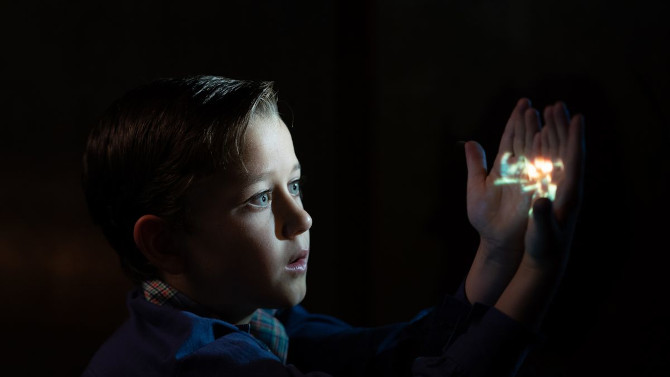
A Pitt Stop
After director John Kosinski got the need for speed while making the big smash hit sequel Top Gun: Maverick back in 2022, he clearly wanted to stay in the fast track, deciding to co-write and direct what has become one of the 2026 Academy Award Best Picture nominees – F1: The Movie (2025). With racer Lewis Hamilton on board as a producer and the film making team getting permission from all of the actual F1 racing teams, they shot at real Grand Prix weekends throughout the 2023 and 2024 seasons, with a faux garage set up between the Mercedes and Ferrari pits... making things look as accurate and impressive as possible. Following longtime driver Sonny Hayes (Brad Pitt – who did most of his own racing), he has become a jack of all trades of sorts – driving everything from F1 and Daytona, to taxi in New York, he is basically a meandering racer-for-hire.
-

Spiels, Fabels, and Other Stories
The FabelmansFebruary 23, 2023Like a reflective revery, Steven Spielberg looks back at his own life with the 2022 Academy Award nominated (seven selections, including Best Picture) feature film The Fabelmans. Co-written (along with Tony Kushner) and directed by Spielberg, he creates a throwback style picture, something along the lines of the moving I Remember Mama (1948)... a sweeping retrospective of love and death, bullying and forgiveness, familial unity and division, over several decades. The Spielberg name becomes Fabelman, with Sammy replacing the name Steven (Gabriel LaBelle; as a younger child, Mateo Zoryan). We open with his parents, the weak tech genius Burt (Paul Dano) and artsy centre of attention Mitzi (Michelle Williams – in an Oscar nominated role) taking him to his first movie – 1952's The Greatest Show on Earth.
-

Meta Mega Mecca
Everything Everywhere All at OnceFebruary 14, 2023If there ever was an Academy Award Best Picture nominee that throws everything at you but the kitchen sink, 2022's Everything Everywhere All at Once, written and directed by Daniel Kwan and Daniel Scheinert, would be it. A philosophical thinking piece woven within an Asian infused Marvel-style multiverse of madness – which incorporates kung-fu action, quirky comedy, marital stress and romance, familial drama, and plenty of adventure, the narrative follows the Wang family: mother Evelyn (Michelle Yeoh), father Waymond (Ke Huy Quan), daughter Joy (Stephanie Hsu), and visiting grandfather Gong Gong (James Hong).
-

Wails of a Waning Friendship
The Banshees of InisherinFebruary 9, 2023Coming off like a fatalistic fairytale, Martin McDonagh’s fourth feature film, The Banshees of Inisherin (2022), has been deemed a pitch black tragicomedy, whereas his other films (In Bruges, Seven Psychopaths, and Three Billboards Outside Ebbing, Missouri) would more simply be described as dark comedies, or dramedies. Subtly drawing symbolic ties to the Irish Civil War of 1922-23 (it is set in 1923), as well as the long lasting strife known as The Troubles (which took place between the 1960s to 90s), this divide is shown by way of muses Pádraic (Colin Farrell) and Colm (Brendan Gleeson).
-

Call Waiting
The Black PhoneOctober 22, 2022A supernatural tinged horror thriller, 2021's The Black Telephone (based upon Joe Hill’s short story of the same name), co-written and directed by Scott Derrickson, might never have you seeing those long corded, wall mounted phones in the same way ever again. Set in 1978, we follow Finney (Mason Thames), and, to a lesser extent, his younger sister Gwen (Madeline McGraw), in what should seemingly be an idyllic childhood in Denver. But, just below the surface, all is not right.
-

New Otherworldly Planetary Extraterrestrials
NopeAugust 24, 2022This is a tricky one to judge. Jordan Peele’s third writing/directorial effort, Nope (2022), is a highly creative and original concept that delves into the science fiction alien field... but is missing something to make it a truly effective effort. With its critics likely pointing to its title as an apt description, the word in fact references character reactions to some sort of alien craft seen in the sky. Though it still might have people pondering whether it means something else – perhaps, ‘Not of Planet Earth’, ‘Newly Ordained People Eaters’, or ‘Never Offer Predators Equines’. Set on a vast horse ranch in rural California, the Haywood family have been providing horses for Hollywood productions since day one (a cool reference back to the original moving picture – a galloping horse ridden by an African American jockey created by Eadweard Muybridge).
-

Bite the Bullet
Bullet TrainAugust 19, 2022Trying to find a playful voice somewhere between a Guy Ritchie gangster flick and Quentin Tarantino (primarily Kill Bill and Pulp Fiction), Bullet Train (2022), written by Zak Olkewicz (based upon Kōtarō Isaka’s novel “Maria Beetle”) and directed by David Leitch (Atomic Blonde; Deadpool 2), does miss from time to time, but it still packs quite the walloping punch. Getting the most out of its fantastic setting, Bullet Train is set on, you guessed it, a bullet train. A journey from Tokyo to the end of the line in Kyoto, there is no better location for a comedic tinged action thriller than on a stunning yet inescapable mode of transportation. Providing a claustrophobic, ultra dangerous environment for our protagonist, Ladybug (Brad Pitt), he is a last minute replacement for infamous hitman Carver – a surprising blink and you’ll miss it cameo I won’t spoil.
